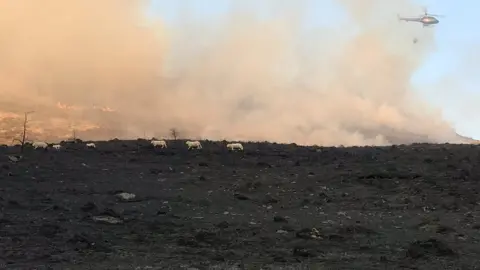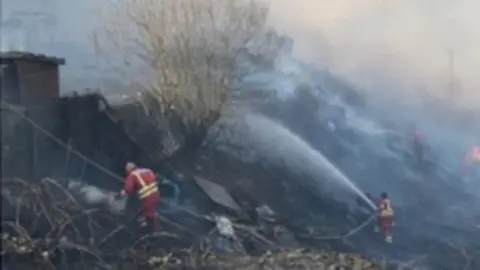Coronavirus: Deliberate grass fires 'causing chaos' in virus
 Craig Hope
Craig HopeArsonists starting forest fires are "trying to cause as much chaos as possible" during the coronavirus pandemic.
More than 500 fires have been deliberately started in south Wales since the start of March.
Over the bank holiday weekend, crews battled a 3,212 acre (13,00 hectare) blaze in the Brecon Beacons.
Natural Resources Wales said since the lockdown, wildlife had been killed and forests destroyed by deliberate fires.
South Wales Fire and Rescue Service (SWFRS) said it had been called to 279 deliberate grass fires and 271 rubbish fires between 1 March and 15 April.
SWFRS wildfire lead Chris Hope told BBC Radio Wales while grass fires were an ongoing problem every year, the number of large forest fires they were seeing was especially problematic during the pandemic.
"We're not having the nuisance fires we'd generally get, we're just having them deliberately set to cause as much chaos as possible," he said.
"We're used to fighting small fires around the south Wales Valleys in the bracken and on the slopes, but at the moment we're fighting large forestry fires and it does put us under pressure."
Allow X content?

On Wednesday, firefighters were called to a large grass fire at the back of Blackvein Industrial Estate in Wattsville, Caerphilly county.
Six fire crews and a helicopter spreading water were used to tackle the blaze, which spread to 197 acres (80 hectares) of grassland and forest.
While on Tuesday night rubbish was set on fire in Hirwaun, Pentwyn and Pontypridd.
Over the bank holiday weekend, crews battled a large forest fire which tore through Brecon Beacons National Park.
A helicopter was used to drop water on the blaze, which started on Friday, and firefighters remained at the scene until Sunday, Mr Hope said.
Allow X content?

Allow X content?

In Rhondda Cynon Taff, two people were left with minor burns and a number were treated for smoke inhalation after a fire on wasteland close to a housing estate.
A fire on Trebanog Hill on 29 March spread to 29 acres (12 hectares) and damaged homes.
Mid and West Wales Fire and Rescue Service said crews had been called to a deliberate fire on Kilvey Hill in Swansea at the same time as a kitchen fire, putting them at risk of a delayed response to a genuine emergency.
 South Wales Fire and Rescue Service
South Wales Fire and Rescue Service The number of grass fires is not unusual for the time of year, with the warm weather.
However, the latest stats showed Wales' three fire services dealt with 4,015 crop, grass, and forest blazes from April 2018 to March 2019, compared with 2,090 in 2017-18.
But with social-distancing measures in place, authorities have pleaded with people to behave responsibly, saying they have been called to hundreds of incidents since schools were closed.
SWFRS's Jason Evans said some of the fires had been "incredibly demanding" and required a lot of resources.
He added: "Deliberate fires are unacceptable at any time, but during a time of national crisis, it beggars belief that we are having this problem."
Natural Resources Wales (NRW) said fires in Afan Valley and Seven Sisters forests since the start of the lockdown had caused more than £100,000 worth of damage.
The five fires, which are being investigated as possible arson, destroyed almost 140 hectares of forest at the end of March and beginning of April, including 80,000 newly planted trees.
"These fires have not only caused massive financial loss to NRW, but will have impacted on the environment, killing wildlife, polluting the air and water," said James Roseblade of NRW.
"At a time where we should all be observing the government rules around staying at home and social distancing, I urge people to think about the impact their fire setting could have on people's lives and the environment."
